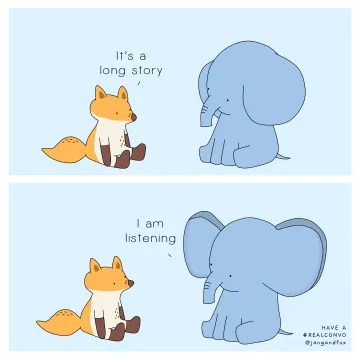How We Talk About Mental Health Matters
Aim for open, honest, and thoughtful conversations.
Everyone Has Mental Health
How To Talk About Mental Health Thoughtfully
The language we use matters. You don’t need any qualifications or special training to make an impact. You are an expert in you. Everyone brings their unique experience with mental health to the conversation, and that’s where the change happens.
Here are some ideas. You don’t have to do all of these things to make a difference. Just one can.
With Yourself
Share on Social
- Curate your feed to see positive mental health messaging. This may mean unfollowing or muting accounts/people or it could mean adding content to your feed that makes you feel good.
- If you talk about mental health online, use positive and normalizing messages.
-
Engage with and share posts from reliable mental health resources.
Be Mindful of Labels
It's part of our everyday language to use phrases like “crazy” or “I’m/they’re freaking out” to talk about our experiences or other people. Be mindful of the words you use, the meaning they have, and how they might impact someone.
- Instead of “crazy” you could call something “wild” or “intense” or “surprising.”
- Instead of “freaking out,” you might say “overwhelmed,” “anxious,” “confused,” or “scared.”
Speak Up
When you’re having a hard time or a bad day, you don’t have to hide it. If you’re comfortable, tell someone you trust. You don’t have to share all the details. It can be helpful to just let someone know you’re having a tough time. You could say something like:
- I've been having a hard time the past few days. Do you have some time to talk?
- I've been really overwhelmed and could use a break. Do you want to grab lunch?
- Ugh. This day 😥😫 [choose your emoji]
With Others
Guide the Conversation
No one’s going to get it right all the time when it comes to talking about mental health. If someone says something that doesn’t sit right with you, step up. You decide how to intervene, whether that’s not doing anything, talking them in the moment, bringing someone aside after the fact, or taking it upon yourself to share educational resources.
- Reflect back using the correct word - without judgment or confrontation.
- Ask, "What do you really mean?" if you hear something that doesn’t sit well with you.
- Share the lesson that you’ve learned - “I just learned/read/heard about this...”
Normalize Mental Health Maintenance
Talk about your own mental health maintenance in a casual, conversational way. We can feel alone in our struggles and might feel guilty about taking care of ourselves. Talking about your own self-care practices and what you do when you’re feeling stressed or overwhelmed can show others that it’s okay and can give them ideas. Share what you do that helps your mental health and ask others what do they do for theirs.
Check In
If you’re concerned about someone in your life, reach out to them. You could initiate a conversation or just let them know you’re there. You could say something like:
- "Hey, I noticed you’ve been down lately. Want to talk about it?"
- "I heard what happened the other day. I’m here if you want someone to vent to or to talk it out or just get your mind off of it for a while."
- "I know today’s a hard day for you. Just want you to know I’m thinking about you and here for you."
Stop the Stigma: A Message From a Suicide Attempt Survivor
How To Have A Conversation About Mental Health
Talking about your mental health or the mental health of others can be uncomfortable and it's worth it. Here are some tips to help you have a more meaningful conversation.
Adapted from AFSP.

